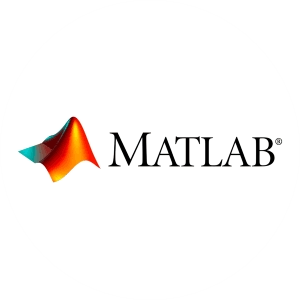
-
MATLAB – Detailed Explanation
MATLAB is a numerical computing environment and programming language developed by MathWorks. It is widely used for data analysis, algorithm development, modeling, simulation, and visualization.
1- On which platform are the tools used?
✅ Supported Platforms:
- Windows: Windows 10/11 (64-bit).
- Linux: Various distributions (Ubuntu, Red Hat, Debian, etc.).
- macOS: macOS 10.15 or later (64-bit).
📱 Additional Platforms:
- MATLAB Online: Cloud-based version accessible via any web browser.
- MATLAB Mobile: Mobile app available for iOS and Android (limited functionality).
2- What hardware requirements are needed?
🔹 Minimum System Requirements:
Component
Windows
Linux
macOS
Processor
Any Intel/AMD 64-bit
Any Intel/AMD 64-bit
Any Intel/Apple Silicon
RAM
4 GB (Recommended: 8 GB or more)
4 GB (Recommended: 8 GB or more)
4 GB (Recommended: 8 GB or more)
Disk Space
4–6 GB for basic installation, more for toolboxes
Same as Windows
Same as Windows
Graphics
No specific requirement, but GPU computing requires CUDA-enabled NVIDIA GPU.
Operating System
Windows 10/11 (64-bit)
Linux (Various Distributions)
macOS 10.15 or later
💡 Higher RAM and disk space are recommended when using toolboxes and handling large datasets.
3- Installation and membership stages
🔹 Installation Steps:
- Download MATLAB:
- From the official website: MATLAB Download.
- Run the installer:
- Follow the installation wizard and select desired toolboxes.
- Activate License:
- Enter the license key (if you have a commercial license) or activate using an academic/student license.
🔹 Membership & Account Setup:
✅ Create MathWorks Account:
- Necessary for downloading and activating MATLAB.
✅ License Types:
- Student License: Affordable, with most toolboxes included.
- Academic License: For educational institutions, offering extensive features.
- Commercial License: Full-featured but more expensive.
- Trial Version: 30-day free trial for evaluation.
💡 MATLAB Online does not require installation and can be accessed via the cloud.
4- What can it be used for?
MATLAB is a versatile tool for mathematical and engineering applications.
🔹 Primary Uses:
✅ Data Analysis & Visualization:
- Creating graphs, plots, and interactive visualizations.
- Statistical analysis and machine learning.
✅ Algorithm Development:
- Prototyping algorithms before implementation.
- Signal processing, image processing, control systems.
✅ Simulation & Modeling:
- Simulink for dynamic system modeling.
- Mathematical modeling of engineering systems.
✅ AI & Machine Learning:
- Neural networks, deep learning, pattern recognition.
✅ Hardware Integration:
- Interfacing with Arduino, Raspberry Pi, and other hardware platforms.
💡 MATLAB is heavily used in research, academia, and industry for its powerful computing capabilities.
5- What is its prominent feature compared to other tools?
✅ Unique Features of MATLAB:
- Built-in Toolboxes: Specialized toolboxes for domains like signal processing, control systems, machine learning, and more.
- MATLAB Language: Easy-to-learn syntax for rapid prototyping.
- Visualization Capabilities: High-quality 2D and 3D plotting.
- Simulink: A powerful graphical programming environment for modeling, simulating, and analyzing dynamic systems.
- MATLAB Online: Convenient access to MATLAB from a web browser.
- Cross-Platform Compatibility: Can run on Windows, macOS, Linux, and even mobile devices via MATLAB Mobile.
💡 MATLAB’s built-in functions and toolboxes make it superior for mathematical computing and simulation compared to other programming languages.
6- Sample application made with pictures
Example 1: Signal Processing & Analysis
- Objective: Analyzing and visualizing a noisy signal.
- Tool Used: Signal Processing Toolbox.
- Result: Clear visualization of the signal before and after noise filtering.
Example 2: Machine Learning Model Creation
- Objective: Classify data using a neural network.
- Tool Used: Deep Learning Toolbox.
- Result: Trained model with visualized classification regions.
7- Which courses can it be used in and is compatible with?
MATLAB is highly compatible with various fields of study.
🔹 Relevant Courses:
- Mathematics: Linear algebra, numerical methods, statistics.
- Computer Science: Machine learning, deep learning, algorithm design.
- Engineering: Control systems, signal processing, robotics, image processing.
- Physics: Computational physics, data analysis, modeling.
- Economics & Finance: Financial modeling, data analysis, optimization.
- Chemistry: Chemical process simulation, molecular modeling.
💡 Many universities include MATLAB as part of their engineering and science curriculums.
8- Is it free?
✅ No, MATLAB is not completely free.
🔹 Free vs Paid Versions:
Feature
Free Trial
Student License
Commercial License
Duration
30 days
Permanent (Academic Use)
Permanent
Toolboxes Included
Limited
Most toolboxes included
All toolboxes available
Price Range
Free
Approx. $50 – $100
From $2000 to $10,000+
Cloud Access (MATLAB Online)
✅ Yes
✅ Yes
✅ Yes
💡 Free trial available, but student licenses are highly affordable.
9- Links related to MATLAB
🔗 Official Website: MATLAB
🔗 Download MATLAB: Download Page
🔗 Documentation: MATLAB Documentation
🔗 MATLAB Online: MATLAB Online
🔗 MATLAB Tutorials: MATLAB Tutorials
🔗 MATLAB Community: MATLAB Central🔹 Conclusion
MATLAB is a versatile tool for mathematics, simulation, and modeling. It provides powerful built-in toolboxes, an easy-to-use programming language, and extensive visualization capabilities.
🚀 Why use MATLAB?
✔ Comprehensive toolboxes for specialized applications.
✔ Easy syntax for fast algorithm development.
✔ Excellent data visualization and plotting features.
✔ Broad compatibility with various hardware.